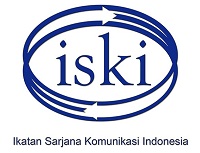Online Independence Day Celebration: Adjusting Group Ties and Social Dynamics in Urban Area
Abstract
Keywords
Full Text:
PDFReferences
Adam, F. P. (2012). Tren Urbanisasi Di Indonesia. Piramida, November, 1–15.
Alutaybi, A., Al-Thani, D., McAlaney, J., & Ali, R. (2020). Combating fear of missing out (Fomo) on social media: The fomo-r method. International Journal of Environmental Research and Public Health, 17(17), 1–28. https://doi.org/10.3390/ijerph17176128
Amanda, M. (2022). Gotong Royong Reflection in The Content of GOTO Advertising at Youtube. Mediator: Jurnal Komunikasi, 15(1), 28–40.
Banicki, K. (2017). The character–personality distinction: An historical, conceptual, and functional investigation. Theory and Psychology, 27(1), 50–68. https://doi.org/10.1177/0959354316684689
Berger, P. L., & Luckmann, T. (1967). The Social Construction of Reality: A Treatise in the Sociology of Knowledge. Anchor Books.
Boellstorff, T., Nardi, B., Pearce, C., & Taylor, T. . (2012). Ethnography and Virtual Worlds: A Handbook of Method. Princeton University Press. https://doi.org/https://doi.org/10.2307/j.cttq9s20
Bolin, G., & Hepp, A. (2017). The Complexities of Mediatization: Charting the Road Ahead. In Dynamics Of Mediatization (pp. 315–331). Springer International Publishing. https://doi.org/10.1007/978-3-319-62983-4_15
Campus, D. (2020). Political Executives and the Mediatization of Politics. In R. B. Andeweg, R. Elgie, L. Helms, J. Kaarbo, & F. Muller-Rommel (Eds.), The Oxford handbook of political executives (pp. 588–607). Oxford University Press.
Celinski, P. (2018). Mediatization and Memory Policies in the Urban Context. Analecta Política, 8(15), 279–299. https://doi.org/10.18566/apolit.v8n15.a06
Couldry, N., & Hepp, A. (2013). Conceptualizing mediatization: Contexts, traditions, arguments. In Communication Theory (Vol. 23, Issue 3, pp. 191–202). https://doi.org/10.1111/comt.12019
Creswell, J. & Poth, C. (2017). Qualitative Inquiry and Research Design Choosing among Five Approaches (4th ed.). SAGE Publications Inc.
De Seta, G. (2020). Three lies of digital ethnography. Journal of Digital Social Research, 2(1), 77–97. https://doi.org/10.33621/jdsr.v2i1.24
Fagerjord, A., & Kueng, L. (2019). Mapping the Core Actors and Flows in Streaming Video Services: What Netflix can Tell Us about These New Media Networks. Journal of Media Business Studies, 16(3), 166–181. https://doi.org/https://doi.org/10.1080/16522354.2019.1684717
Fakhruroji, M. (2015). Mediatization of religion in “texting culture”: self-help religion and the shifting of religious authority. Indonesian Journal of Islam and Muslim Societies, 5(2), 231. https://doi.org/10.18326/ijims.v5i2.231-254
Figueiras, R. (2017). Mediatization studies: causalities, centralities, interdisciplinarities. MATRIZes, 11(1), 101–126. https://doi.org/http://dx.doi.org/10.11606/issn.1982-8160.v11i1p101-126
Flew, T. (2017). The ‘Theory’ in media theory: The ‘Media-Centrism’ debate. Media Theory, 1(1), 43–56. https://eprints.qut.edu.au/112748/
Fornäs, J., & Kaun, A. (2011). Medialisering av kultur, politik, vardag och forskning: Slutrapport från Riksbankens Jubileumsfonds forskarsymposium i Stockholm 18–19 augusti 2011. In Mediestudier vid Södertörn.
Fuchs, C. (2020). Everyday life and everyday communication in coronavirus capitalism. TripleC, 18(1), 375–399. https://doi.org/10.31269/triplec.v18i1.1167
Hänska, M. & Bauchowitz, S. (2017). Tweeting for Brexit: how social media influenced the referendum. Brexit, Trump and the Media, 31–35.
Harahap, H. (2017). Preferensi Media Masyarakat Jabodetabek Dan Faktor Faktor Yang Mempengaruhinya. Jurnal Studi Komunikasi Dan Media, 21(1), 43. https://doi.org/10.31445/jskm.2017.210104
Hepp, A. (2019). Deep Mediatization (1st ed.). Routledge. https://doi.org/10.4324/9781351064903
Hepp, A., Hjarvard, S., & Lundby, K. (2015). Mediatization: theorizing the interplay between media, culture and society. Media, Culture and Society, 37(2), 314–324. https://doi.org/10.1177/0163443715573835
Hepp, A., & Krotz, F. (2014). Mediatized Worlds: Culture and Society in a Media Age. In Mediatized Worlds: Culture and Society in a Media Age. Palgrave Macmillan. https://doi.org/10.1057/9781137300355
Hjarvard, S. (2014). Mediatization and cultural and social change: An institutional perspective. In K. Lundby (Ed.), Mediatization of Communication (pp. 199–226). De Gruyter. https://doi.org/10.1515/9783110272215.199
Jansson, A., Lövheim, M., Paasonen, S., & Sumiala, J. (2013). Social media: implications for everyday life, politics and human agency. Approaching Religion, 3(2), 26–37. https://doi.org/10.30664/ar.67514
Kriyantono, R., & McKenna, B. (2017). Developing a culturally-relevant public relations theory for Indonesia. Jurnal Komunikasi: Malaysian Journal of Communication, 33(1), 1–16. https://doi.org/10.17576/jkmjc-2017-3301-01
Krotz, F. (2017). Explaining the mediatisation approach. Javnost, 24(2), 103–118. https://doi.org/10.1080/13183222.2017.1298556
Krotz, F., & Hepp, A. (2013). A concretization of mediatization: How ‘mediatization works’ and why mediatized worlds are a helpful concept for empirical mediatization research. Empedocles: European Journal for the Philosophy of Communication, 3(2), 137–152. https://doi.org/10.1386/ejpc.3.2.137_1
Lekhanya, L. M. (2013). Cultural Influence On The Diffusion And Adoption Of Social Media Technologies By Entrepreneurs In Rural South Africa. International Business & Economics Research Journal (IBER), 12(12), 1563. https://doi.org/10.19030/iber.v12i12.8250
Lim, M. (2017). Freedom to hate: social media, algorithmic enclaves, and the rise of tribal nationalism in Indonesia. Critical Asian Studies, 49(3), 411–427. https://doi.org/10.1080/14672715.2017.1341188
Lotan, F. (2019). Making a positive internet through Socmed Agawe Guyub. International Journal of Communication and Society, 1(1), 9–16. https://doi.org/10.31763/ijcs.v1i1.22
Lövheim, M., & Hjarvard, S. (2019). The Mediatized Conditions of Contemporary Religion: Critical Status and Future Directions. Journal of Religion, Media and Digital Culture, 8(2), 206–225. https://doi.org/10.1163/21659214-00802002
Lunt, P., & Livingstone, S. (2016). Is ‘mediatization’ the new paradigm for our field? A commentary on Deacon and Stanyer (2014, 2015) and Hepp, Hjarvard and Lundby (2015). Media, Culture and Society, 38(3), 462–470. https://doi.org/10.1177/0163443716631288
Motta, L. G. (2005). The opposition between mediacentric and sociocentric paradigms. Brazilian Journalism Research, 1(1), 61–86.
Ni’amah, L. U. (2018). Pemilih Muda, Sosial Media dan Partisipasi Pemilih Pada Pemilihan Kepala Daerah Tulungagung 2018. Al-I’lam: Jurnal Komunikasi Dan Penyiaran Islam, 2(1), 22–36.
Novita, Lubis, K. S., Syahsudarmi, S., & Srimulatsih, M. (2018). The Activeness of Women Follow the Arisan Group: A Case Study of Community Groups Vs Professional. IOP Conference Series: Earth and Environmental Science, 175(1). https://doi.org/10.1088/1755-1315/175/1/012089
Nurhayati, N., Setiyowati, R., & Nurmalisa, Y. (2021). Bhinneka Tunggal Ika As A National Consensus And A Universal Tool Of The Indonesian Nation. JED (Jurnal Etika Demokrasi), 6(2), 254–263. https://doi.org/10.26618/jed.v6i2.5317
Panggita, A. A. (2021). The Implementation of IMC Tools on Marketing Communication in Niche Market @kedaionyi During Covid-19 Pandemic. Mediator: Jurnal Komunikasi, 14(2), 145–156. https://doi.org/10.29313/mediator.v14i2.8100
Passoth, J. H., Sutter, T., & Wehner, J. (2014). The quantified listener: Reshaping providers and audiences with calculated measurement. In A. Hepp & F. Krotz (Eds.), Mediatized Worlds. Palgrave.
Pink, S., Horst, H., Postill, J., Hjorth, L., Lewis, T., & Tacchi, J. (2016). Digital Ethnography: Principles and Practice. Sage Publications.
Purbo, O. W. (2017). Narrowing the Digital Divide. In E. Jurriens & R. Tapsell (Ed.), Narrowing the digital divide. (Digital In, pp. 75–92). ISEAS–Yusof Ishak Institute. https://doi.org/10.4018/9781591404798.ch015
Santoso, A. D., Rinjany, D. K., & Bafadhal, O. M. (2020). Social media and local government in indonesia: Adoption, use and stakeholder engagement. Romanian Journal of Communication and Public Relations, 22(3), 21–35. https://doi.org/10.21018/RJCPR.2020.3.307
Santoso, B., & Djauhari, M. A. (2019). Indonesian 2019 General Election: Who Will Be The Future Leader? Global Media Journal, 17(32), 1–5.
Scolari, C., & Rodriguez-Amat, J. R. (2018). A latin american approach to mediatization: Specificities and contributions to a global discussion about how the media shape contemporary societies. Communication Theory, 28(2), 131–154. https://doi.org/10.1093/ct/qtx004
Setiadi, H. (2018). Perubahan Identitas Tempat Dan Konflik Ruang DI Pinggiran: Studi Awal Tentang Urban Habitus Dalam Transformasi Ruang Di Kota Depok, Jawa Barat. Ruang : Jurnal Lingkungan Binaan, 05(01), 37–50.
Sirpa, T. (2018). A Village Goes Mobile: Telephony, Mediation and Social Change in Rural India. Oxford University Press. https://doi.org/10.1093/oso/9780190630270.001.0001
Sorokin, P. A. (1947). Society, Culture, and Personality: Their Structure and Dynamics, A System of General Sociology. Harper.
Subijanto, R. (2020). Communication as Social Networks and Transportation: Historical Studies Past and Present. The Forum Amir Effendi Siregar. https://www.youtube.com/watch?v=dBA0mz2xel4&t=698s
Supriadi, Y., Drajat, M. S., Saleh, N. L., R., A. S., & Huda, A. S. N. (2020). The Role of the West Java Indonesian Broadcasting Commission (KPID) in Preventing Citizen Panic Related to News and Information Regarding Covid-19. Mediator: Jurnal Komunikasi, 13(2), 167–177. https://doi.org/10.29313/mediator.v13i2.6573
Švelch, J. (2020). Mediatization of a Card Game: Magic: The Gathering, Esports, and Streaming. Media, Culture & Society, 42(6), 838–856. https://doi.org/https://doi.org/10.1177/0163443719876536
Triastuti, E. (2013). Indonesian women blogging: from Serambi Mekka (Aceh) to Batawi (Jakarta) and in between [University of Wollongong]. https://ro.uow.edu.au/theses/4169/
Wagnsson, C., & Barzanje, C. (2021). A Framework for Analysing Antagonistic Narrative Strategies: A Russian Tale of Swedish Decline. Media, War & Conflict, 14(2), 239–257. https://doi.org/https://doi.org/10.1177/1750635219884343
Wiguna, A., & Nuraeni, R. (2021). Management of Alternative Media Kawalcovid19 As a Source of Information During the Covid-19 Pandemic. Mediator: Jurnal Komunikasi, 14(2), 229–239. https://doi.org/10.29313/mediator.v14i2.8415
Wiwitan, T., Drajat, M. S., & Nurrahmawati, N. (2021). Service Communication On Unisba Student Satisfaction During The Covid-19 Pandemic. Mediator: Jurnal Komunikasi, 14(2), 183–194. https://doi.org/10.29313/mediator.v14i2.8327
Wohn, D. Y., & Bowe, B. J. (2014). Crystallization: How social media facilitates social construction of reality. Proceedings of the ACM Conference on Computer Supported Cooperative Work, CSCW, February, 261–264. https://doi.org/10.1145/2556420.2556509
Woods, M. (2005). Rural Geography. Sage Publications.
DOI: https://doi.org/10.29313/mediator.v15i2.9778
Refbacks
- There are currently no refbacks.

This work is licensed under a Creative Commons Attribution 4.0 International License























